Becoming a new dad is a life-changing event.
It can test the strength of your relationship with your partner. If this is your first baby, you’re shifting from being partners to becoming parents together. If you already have children, you’re adjusting to caring for another baby in a busy household. Add sleep deprivation to the mix, and even the strongest relationships can feel the strain.
You might be noticing unexpected differences in how you each want to care for your baby. Or you might have different ideas about managing paid work and unpaid parenting and household duties. If you’ve never discussed these issues before, bringing them up now can sometimes cause conflict and tension.
If other issues are in the mix, such as financial stress, problems at work, social or physical isolation, or extended family concerns, your relationship can be affected by all the extra layers of stress. Advance awareness of potential problems and being open to ways of managing your way through these can help keep your relationship in good shape.
Relationship tips for new dads
1
Talk to each other
2
Parenting
3
Work
4
Support network
5
Sex and emotional connection
6
Visitors and socialising
7
Counselling
8
Caring for your partner
Early parenthood is a time of joy and celebration, but it can also be stressful, exhausting, and overwhelming. Hold off, if you can, on making any big life decisions right now - like changes to your relationship, career, or home.
Give yourself permission to simply focus on looking after your partner, your baby, and yourself for the moment.
Reach out and ask for help if you need it – whether that’s family and friends, your employer, or a trusted health professional. All new parents need support, and PANDA is here for you if you want to chat about ways to manage competing demands in your relationships.
Stories
Stories about dads
Articles
Support for dads
Mental health checklist
How are you going?
Everyone’s experience of pregnancy, birth and parenting is unique and brings different rewards and challenges. Our mental health checklist can help you to see if what you’re experiencing or observing in a loved one could be reason to seek help.


